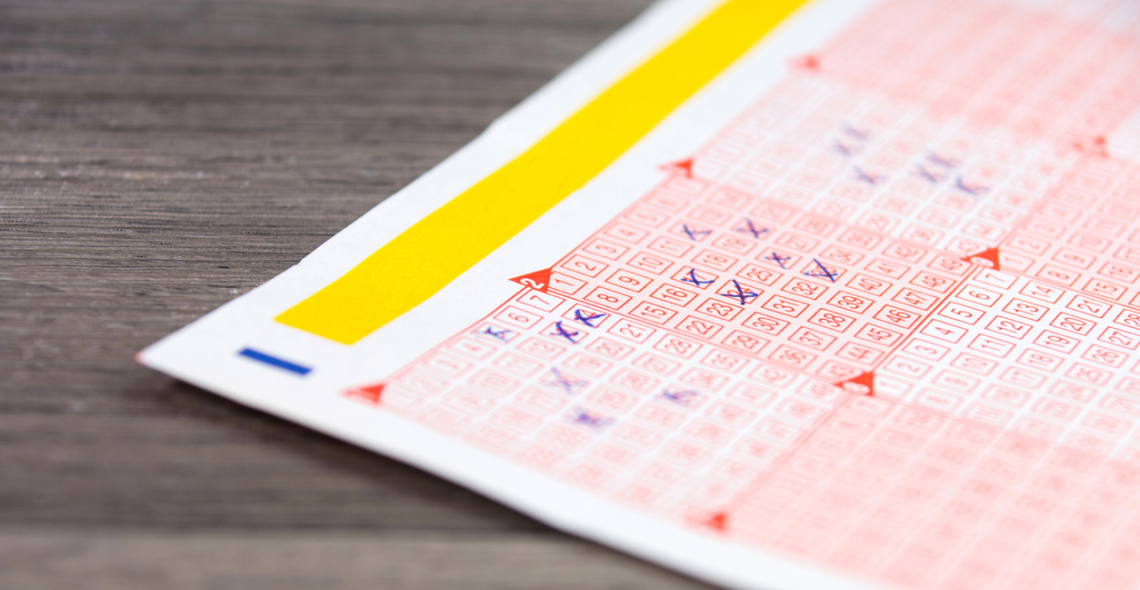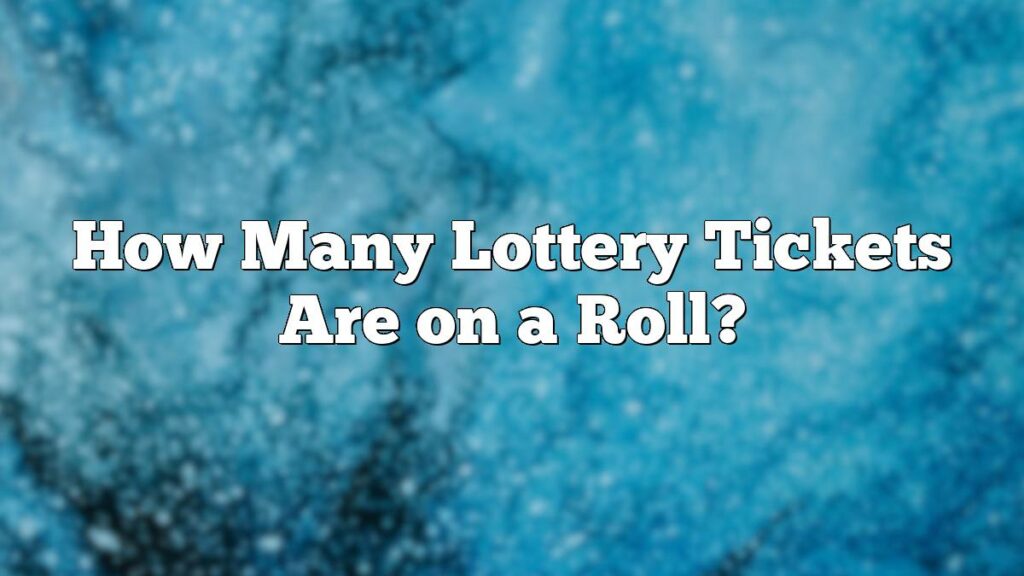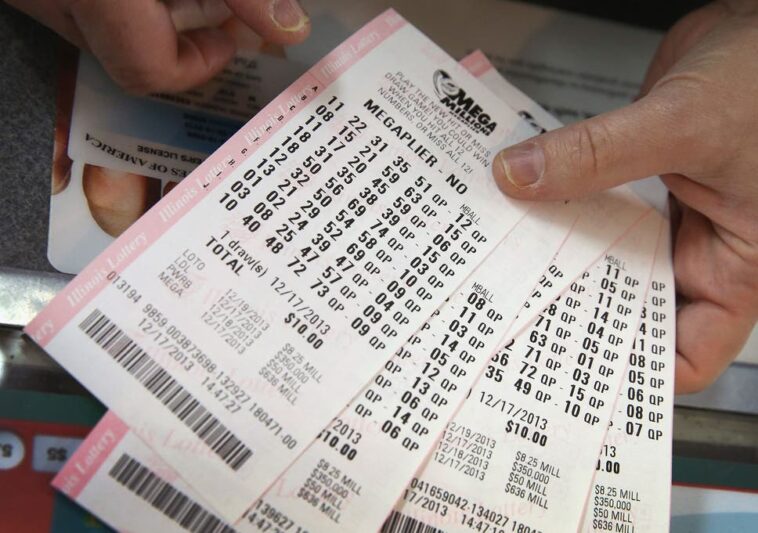Is Buying A Roll Of Lottery Tickets Worth It? Find Out Here!
Ever dreamt of striking gold with a single scratch? Buying a roll of lottery tickets might seem like the express lane to riches, but is it a savvy strategy or a fool's errand? The allure of instant gratification and the tantalizing prospect of a life-altering win make the idea undeniably appealing.
The concept is simple enough: instead of purchasing individual tickets sporadically, you acquire an entire roll at once. This bulk purchase promises a concentrated dose of lottery action, a potential shortcut to hitting multiple winning tickets. But before you rush out to your nearest lottery retailer, let's dissect the pros and cons, the costs, and the cold, hard probabilities that govern this high-stakes game.
| Aspect | Details |
|---|---|
| Ticket Type Examples | Billion Dollar Blockbuster, Monopoly, Lucky for Life |
| Roll Size Examples | 50 tickets, 250 tickets, 20 tickets |
| Price per Ticket Examples | $1, $5, $20, $50 |
| Total Roll Cost Examples | $250, $300, $1000 |
| Where to Buy | Authorized Lottery Retailers, Online Lottery Sites (where permitted) |
| Arkansas Lottery Info | Arkansas Scholarship Lottery Website |
The primary motivation behind buying a roll of lottery tickets often boils down to perceived increased odds. The logic goes something like this: if there are a certain number of winning tickets within a roll, buying the entire roll guarantees that you'll snag at least some of those winners. However, this perception is often a mirage. Lottery officials design games to ensure a specific payout percentage, meaning that regardless of how you purchase your tickets, the overall odds remain the same. You're not somehow bending the laws of probability by buying in bulk; you're simply increasing the volume of your wagers.
- Wayne Mardle Wife Cancer A Heartfelt Journey Through Trials And Triumphs
- Mirror Racing Tips Your Ultimate Guide To Winning Every Time
Consider the economics of it. A "Billion Dollar Blockbuster" or "Monopoly" roll with 50 tickets at $20 each will set you back a cool $1,000. A "Lucky for Life" roll, similarly structured, will also require a substantial upfront investment. Before you commit such a sum, it's crucial to understand that most of that money will likely be lost. Lotteries are, by their very nature, designed to generate revenue for the state or organization running them. This means that the prize money awarded is always less than the total money spent on tickets.
One individual shared their experience, noting a desire to avoid the casino and instead purchase a roll of scratch-off tickets, around $300 in their estimation. The reasoning was that even if they didn't recoup the full $300, they might at least recover a portion. This illustrates a common gambler's fallacy – the belief that a loss is somehow mitigated by the chance of recovering some of the initial investment. In reality, each ticket is an independent event, and past losses have no bearing on future outcomes.
The cost of an entire roll is directly proportional to the price per ticket and the number of tickets in the roll. A roll of 250 tickets priced at $1 apiece will cost $250. Conversely, a roll of just 20 tickets with a $50 value each can reach $1,000. This highlights the importance of doing the math before you buy. It's easy to get caught up in the excitement and overlook the substantial financial commitment involved.
- Alison Titchmarsh The Queen Of British Tv And Beyond
- Kalina Marie Wedding Venue The Perfect Spot For Your Dream Wedding
Some players believe in strategies like buying tickets early in a lotto game, reasoning that early tickets have a higher chance of being winners. The logic behind this is that while consecutive winning tickets are rare, most rolls contain a few winners. If a roll is nearing its end, the assumption is that the major prizes have already been claimed. While this may sound plausible, it's not supported by any concrete evidence. Lottery outcomes are generally random, and the timing of your purchase shouldn't influence your odds.
In Pennsylvania, for example, a roll of $2 tickets might contain 150 tickets, while a roll of $5 tickets might contain 60. The $5 tickets often offer slightly better odds and larger prizes, but they can also lead to longer stretches of non-winning tickets. Ultimately, the best approach is to be strategic and consider the number of tickets still in circulation and the availability of jackpots and top prizes.
However, experts generally advise against buying books or rolls of lottery tickets. While playing the lottery is already a negative expectation bet, buying in bulk amplifies the risk. One person shared an anecdote about buying a whole roll of $20 tickets and winning a $500 prize halfway through. While this might seem like a victory, the individual correctly surmised that the roll likely didn't contain another major prize. This illustrates the diminishing returns that often accompany bulk purchases.
Another group of friends recounted their experience of buying a pack of $5 tickets. It's important to approach such endeavors with caution and a clear understanding of the risks involved. Lottery winnings are never guaranteed, and it's crucial to gamble responsibly and within your means.
Individual preferences also play a role. Some players prefer to buy a single $20 ticket, while others opt for multiple $2, $3, or $5 tickets. One player reported winning $500 once and $100 several times over five years of playing. These isolated instances of success can be misleading, as they don't reflect the overall odds of winning. It's essential to maintain a realistic perspective and avoid chasing losses.
Security measures are also in place to prevent fraud and theft. In the USA, scratch-off tickets have codes that identify winning tickets. If a stolen ticket is cashed in, authorities are immediately alerted. Furthermore, tickets are not activated until purchased, making it difficult to profit from stealing a roll of scratch-offs. It's akin to trying to steal prepaid cards from a major retailer – the risks far outweigh the potential rewards.
For those who enjoy the lottery as a form of entertainment, purchasing a bulk roll of tickets can provide a month's worth of amusement. Many players choose to ration their tickets throughout the month, spreading out the excitement. However, it's crucial to set a budget and stick to it, regardless of whether you're buying individual tickets or entire rolls.
The advent of online lottery sites has made it even easier to purchase scratch cards. You can simply visit a reputable online lottery site, enter your banking or credit card details, and buy tickets whenever you want. However, it's essential to verify the legitimacy of the online site before providing any personal or financial information. Stick to well-known and trusted platforms to avoid scams and fraudulent activities.
Ultimately, the decision of whether to buy a roll of lottery tickets is a personal one. There are no guarantees of success, and the odds are generally stacked against you. If you choose to indulge in this form of gambling, do so responsibly, within your means, and with a clear understanding of the risks involved. Treat it as entertainment, not as an investment strategy.
Before venturing into purchasing rolls of lottery tickets, consider alternative investment strategies that offer a more predictable path to financial growth. Consulting with a financial advisor can provide valuable insights into diversified portfolios and long-term financial planning. Remember, building wealth requires patience, discipline, and a sound understanding of financial principles.
One key aspect often overlooked is the emotional component. The thrill of scratching off a ticket and the momentary anticipation of a win can be addictive for some individuals. It's essential to be aware of your own susceptibility to gambling addiction and to seek help if you feel that your lottery playing is becoming problematic. Resources are available to provide support and guidance for responsible gambling habits.
Furthermore, the social implications of buying lottery tickets should also be considered. Buying a roll of tickets with friends, as one person described, can be a fun and engaging activity. However, it's crucial to establish clear rules and expectations beforehand to avoid any potential conflicts or misunderstandings. Discuss how winnings will be divided and what happens if someone wants to withdraw from the group. Open communication is essential for maintaining positive relationships.
Another factor to consider is the tax implications of lottery winnings. Depending on the size of the prize, you may be required to pay federal and state taxes. It's advisable to consult with a tax professional to understand your obligations and to ensure that you are complying with all applicable laws. Failure to report lottery winnings can result in penalties and legal issues.
In conclusion, while the allure of striking it rich with a roll of lottery tickets is undeniable, it's essential to approach this form of gambling with caution and a realistic understanding of the odds. Buying in bulk does not magically increase your chances of winning, and the financial risks can be significant. Gamble responsibly, within your means, and always prioritize your financial well-being.
The Arkansas Scholarship Lottery, like many state lotteries, offers a variety of games with different prize structures and odds. Familiarizing yourself with the rules and regulations of each game can help you make informed decisions about which tickets to buy. The Arkansas Scholarship Lottery website provides detailed information about each game, including the draw schedule, prize amounts, and odds of winning. It's a valuable resource for anyone who participates in the lottery.
Ultimately, the lottery is a game of chance, and there are no foolproof strategies for winning. Whether you buy individual tickets or entire rolls, your chances of hitting the jackpot are slim. However, if you enjoy the excitement and the possibility of winning, remember to gamble responsibly and within your means. And never forget that the primary purpose of the lottery is to generate revenue for the state, not to make you rich.
The experience of one lottery player highlighted the potential pitfalls of relying on scratch-off tickets for financial gain. Although they had occasional small wins, the overall outcome was a net loss. This underscores the importance of viewing the lottery as a form of entertainment rather than a means of supplementing income or achieving financial security. There are far more reliable and sustainable ways to build wealth and achieve your financial goals.
In addition to the financial risks, it's also important to be aware of the potential social consequences of gambling. Spending excessive amounts of time and money on lottery tickets can strain relationships and lead to feelings of isolation. It's crucial to maintain a healthy balance between gambling and other aspects of your life, such as work, family, and hobbies. If you find that gambling is interfering with your personal relationships or your overall well-being, it's time to seek professional help.
The digital age has also brought new opportunities for lottery players. Online lottery platforms offer a convenient way to purchase tickets and check results from the comfort of your own home. However, it's essential to be vigilant about online security and to avoid falling prey to scams or fraudulent activities. Only use reputable and licensed online lottery platforms and never share your personal or financial information with untrusted sources.
Before diving into the world of lottery tickets, take a moment to assess your financial situation and to set realistic expectations. The lottery should be viewed as a form of entertainment, not as a path to riches. Gamble responsibly, within your means, and always prioritize your financial well-being. There are far more sustainable and reliable ways to achieve your financial goals.
Ultimately, the decision of whether or not to buy a roll of lottery tickets is a personal one. However, it's important to make that decision based on a clear understanding of the risks involved and a commitment to responsible gambling. The lottery can be a fun and exciting pastime, but it should never be viewed as a means of achieving financial security or solving financial problems. Prioritize your financial well-being and make informed decisions about your spending habits.
Moreover, the accessibility of lottery tickets can be a double-edged sword. While the ease of purchasing tickets may seem convenient, it can also lead to impulsive spending and overindulgence. It's crucial to be mindful of your spending habits and to set limits on how much you spend on lottery tickets each week or month. Sticking to a budget can help you avoid overspending and maintain control over your finances.
Additionally, it's important to be aware of the potential for lottery scams and fraudulent activities. Scammers often target lottery players with fake winning notifications or requests for personal information. Never provide your personal or financial information to anyone who claims to be associated with the lottery without verifying their identity and legitimacy. Be cautious of unsolicited emails, phone calls, or letters claiming that you have won a prize, and never send money to claim a lottery prize.
When considering buying a roll of lottery tickets, it's also worth exploring alternative forms of entertainment that offer better value for your money. There are countless hobbies and activities that can provide enjoyment and fulfillment without the same level of financial risk as gambling. Consider investing in a hobby, taking a class, or volunteering your time. These activities can be both rewarding and enriching, and they won't leave you with the empty feeling that often accompanies losing money on the lottery.
In conclusion, the decision to buy a roll of lottery tickets should be made with careful consideration and a clear understanding of the risks involved. While the potential for winning a large prize may be enticing, the odds are stacked against you, and the financial risks can be significant. Gamble responsibly, within your means, and always prioritize your financial well-being. Remember that the lottery is a form of entertainment, not a means of achieving financial security or solving financial problems.
Finally, remember that the lottery is not a substitute for sound financial planning. Building wealth and achieving financial security requires a long-term strategy that includes saving, investing, and managing debt. Consult with a financial advisor to develop a personalized financial plan that aligns with your goals and risk tolerance. Avoid relying on the lottery as a shortcut to riches, and instead focus on building a solid foundation for your financial future.



Detail Author:
- Name : Edd Collins
- Username : wendy72
- Email : matteo.crooks@hessel.info
- Birthdate : 2004-08-20
- Address : 4215 King Circle Spinkaberg, ID 94427-4958
- Phone : 1-386-495-1025
- Company : Kunze PLC
- Job : Transportation Attendant
- Bio : In velit tenetur occaecati modi ut dignissimos quis. Aliquam quod vitae et libero animi. Cum aut perspiciatis in ea explicabo minima. Aspernatur recusandae id corporis sed neque labore.
Socials
twitter:
- url : https://twitter.com/oheidenreich
- username : oheidenreich
- bio : Dolor porro dolorem omnis temporibus aliquid qui dolorum. Est voluptatem ullam dolores rem. Soluta illum tenetur qui qui error qui odit.
- followers : 5994
- following : 2558
tiktok:
- url : https://tiktok.com/@oheidenreich
- username : oheidenreich
- bio : Quae vel voluptate adipisci et molestias beatae.
- followers : 5583
- following : 1468
facebook:
- url : https://facebook.com/olga3915
- username : olga3915
- bio : Cupiditate eum eligendi eos provident. Alias aperiam sed aliquid neque.
- followers : 5412
- following : 2822